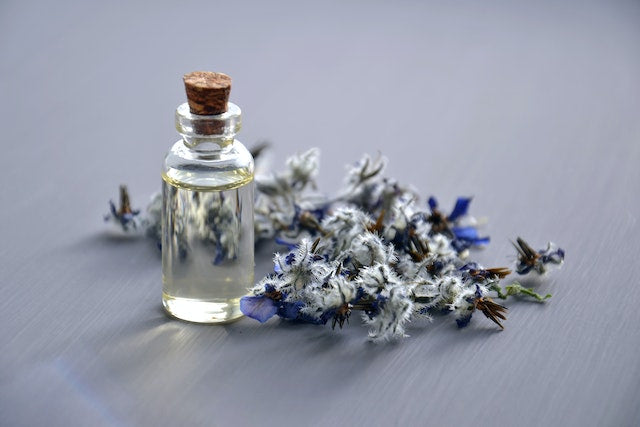Benefits of Different Essential Oils

Essential oils are concentrated oils, extracted from a variety of plants which are traditionally used in natural health therapies. Here we look at 24 of the most popular essential oils, their potential benefits, and how they can be used.
What Are Essential Oils?
Essential oils are compounds that have been extracted from plant leaves, roots and bark. They are called ‘essential’ oils as they retain the plant’s scent and flavour, or ‘essence’. They are highly concentrated and are extracted from the plant by either distillation or cold pressing. Distillation is when water or steam is passed through the plant, removing the essential compounds to make the oil. Cold pressing is when the plant is squeezed to extract the juices and oils.
Sometimes, before they are used, essential oils are mixed with ‘carrier oils’ - this dilutes them so they are kinder to skin (and it also means more product can be made from the same amount of oil). Carrier oils are made of vegetable oils like coconut, or evening primrose.
What Are The Benefits of Essential Oils?
There are many ways that essential oils have been shown to help, including in the following ways:
Improve quality of sleep
Smelling oils such as lavender has been shown to improve sleep quality.
Reduce inflammation
Some essential oils have been shown to have anti-inflammatory properties. More studies on humans are needed, however, but tests on mice have shown that thyme and oregano essential oils helped reduce instances of colitis.
Relieve headaches
It has long been thought that dabbing peppermint oil or chamomile on your temples can reduce headache pain.
Reduce anxiety and stress
Essential oils are often used in conjunction with traditional therapy to relieve symptoms of stress. While more studies are needed to confirm the efficacy of the oils, the scents are often conducive to a relaxed and calming environment.
Boost mood
Essential oils are often used in a therapy environment and can induce a calming, positive and relaxing environment for an enhanced feeling of wellbeing.
Kill bacteria
Again, while more studies are needed on humans, essential oils including peppermint oil and tea tree oil have shown antimicrobial properties. Results have shown this in test tube environments but not yet inside a human body.
How To Use Essential Oils
Essential oils are used in aromatherapy, a healing treatment that uses these natural plant extracts to promote health and well-being (in fact, it is also known as essential oil therapy). Aromatherapy uses aromatic essential oils to enhance both physical and emotional health.
As well as inhaling, massaging essential oils (appropriately diluted) into the skin may also deliver the active compounds to the body. You should never apply essential oils directly to the skin undiluted, unless under the guidance of a healthcare professional.
It is also dangerous to swallow essential oils. Not only are essential oils very concentrated, but they can also irritate cells inside the body.
24 Essential Oils and Their Benefits
Lavender Oil
Lavender essential oil is one of the most popular essential oils and is frequently used in aromatherapy. Distilled from the plant Lavandula angustifolia, it helps promote relaxation and is believed to treat fungal infections, menstrual cramps, allergies, depression, sleep issues, eczema and nausea.
Spearmint
Spearmint essential oil is multi-purpose and it continues to be used to soothe ailments such as skin problems, headaches, nausea, vomiting, respiratory issues, and cold symptoms.
Baobab Oil
Baobab oil helps to prevent palmoplantar erythema (reddening, peeling of hands and feet) to reduce tingling and desquamation (peeling of the skin) and improve the appearance of cuticles, nails and hair. It is a great remedy for severely damaged, dry and flaking skin.
Ylang-Ylang
Ylang ylang is a yellow flower that grows on the Cananga tree in countries surrounding the Indian ocean. One of the oils from the flower is often used in perfumes like Chanel. Others are used topically or through inhalation to reduce anxiety, induce a sense of calm, slow the heart rate and reduce fungal infection.
Eucalyptus Oil
Extracted from the leaves of the eucalyptus tree, it originated in Australia where Aboriginal people first used it as a remedy for fever, wounds, infections, aches and colds. It’s likely you’re familiar with the smell of this oil. It is a natural anti-inflammatory and antiseptic which helps promote the healing of wounds. It’s also used as a disinfectant in the home.
Peppermint Oil
Peppermint is often used as a flavour in food and drink, as well as being a fragrance in soaps and cosmetic products. It can be taken orally in dietary supplements or applied to the skin as ointment. Peppermint oil has been shown to help with IBS and digestion.
Tea Tree Oil
Diluted tea tree oil has benefits for the skin, such as helping soothe itchy skin, help wounds to heal and reduce dandruff. It’s said to be helpful for healthy hair and nail maintenance. It’s also been used in mouthwash, deodorant, and as a natural insect repellent.
Frankincense Oil
Frankincense can help with inflammation, mood and sleep. Studies have shown that it can also improve asthma and might prevent gum disease (although more research is needed in this area). Frankincense oil has a woody scent and is used in aromatherapy as well as in skin creams.
Sandalwood
Sandalwood oil is used in many perfumes as it has a pleasant scent and can calm nerves and help with focus. It has anti-inflammatory properties and can also fight bacteria and help facilitate the healing of wounds.
Rose
Benefits of rose oil include helping skin heal and moisturising it, fighting inflammation, relieving stress and promoting blood circulation.
Chamomile
As with most essential oils, chamomile oil is extracted from chamomile plant flowers, using steam distillation. It is often used in diffusers for its scent. It is also commonly added to bathwater (5 or so drops) for an aromatic bath, or rubbed into skin to moisturise and help skin condition.
Bergamot Oil
Bergamot oil is extracted from the bergamot orange tree, and its benefits include antibacterial properties to fight infection, anti-inflammatory compounds to relieve pain, calming properties to relieve stress, and to aid digestion.
Jasmine
Research supports that jasmine essential oil benefits extend to potentially boosting mood. One study analysed how a jasmine-oil-infused massage can impact the body and found that it increased breathing rate and blood oxygen saturation.
Turmeric
Most commonly known as a powder spice used in Indian food, turmeric in essential oil form is believed to cleanse, calm, invigorate, strengthen and exfoliate the skin, helping promote skin elasticity and firmness.
Geranium
Used in aromatherapy, geranium essential oil reduces feelings of stress, anxiety and fatigue, enhances concentration and improves cognitive function.
Used medicinally, it can work as an anti-inflammatory and antiseptic substance. It is reputed to enhance circulation, soothe symptoms of menstruation, boost immunity and reduce blood pressure.
Used topically, it can eliminate dead cells, tighten the skin, and promote the regeneration of new cells.
Lemongrass Oil
Lemongrass oil is packed with antioxidants which fight free radicals and reduce signs of ageing. It can also help with stomach upsets as well as reportedly helping to ease symptoms of rheumatoid arthritis thanks to its anti-inflammatory benefits.
Orange Oil
Orange oil makes a good household cleaner with its fresh scent and cleaning properties. It’s also used frequently in moisturisers as it has antioxidants to help keep skin looking youthful.
Patchouli
Patchouli essential oil has many uses and benefits for mind and body. It can help reduce the appearance of wrinkles and blemishes to promote a smooth and glowing complexion.
Patchouli essential oil is often used in perfumes and colognes and can emit a natural musk when applied to the skin. The aroma of Patchouli essential oil is perfect for use in diffusers, and can have a balancing effect on emotions when inhaled or used topically.
Rosemary Oil
Rosemary essential oil has a woodsy fragrance and is commonly used in aromatherapy. It is commonly used to relieve symptoms of allergies and colds. When inhaled its antiseptic properties can help fight respiratory problems. It can also reportedly be used to promote hair growth by massaging into the scalp.
Ginger
Ginger oil is often used to settle the stomach when used in a diffuser. As with many other essential oils, it has antioxidant properties and is therefore useful as part of a skincare regime to help keep skin looking youthful. It can be diluted and applied topically.
Citronella
Used in aromatherapy applications, Citronella essential oil slows the growth or spread of harmful airborne bacteria, repels flying insects (often used in candles or burners), helps boost mood, and relaxes the body and mind.
Cedarwood Oil
A small study indicated that people with alopecia areata experienced noticeable hair growth when given a daily scalp massage of cedarwood oil, as well as thyme, rosemary, and lavender essential oils, along with a carrier oil. This mixture was applied directly to the scalp.
It also has sedative properties so is useful in aromatherapy, diffusers or as a few drops in a bath before bed, to aid sleep.
Lemon Oil
Lemon oil should never be ingested, but it is safe to use in aromatherapy and diluted, topical applications to help with anxiety, reduce morning sickness, improve alertness and help with skin quality.
This combination of essential oils contains lemon oil alongside several others, mixed in specific proportions for a powerful revitalising effect on all body systems. The oils support deep relaxation and restore mental balance.
Star Anise
Star anise contains a huge array of compounds in its essential oil that means it offers a wide range of health benefits. These include promoting healthy skin, improving sleep quality, supporting respiratory health, maintaining healthy digestion, fighting fungal infections and boosting immune system function.
-
It’s clear that there are a lot of common benefits across the spectrum of essential oils, with certain oils providing unique benefits. It’s worth considering the whole range of available oils and choosing the ones that best suit your lifestyle and health needs to give you the benefits you need.

Leave a comment